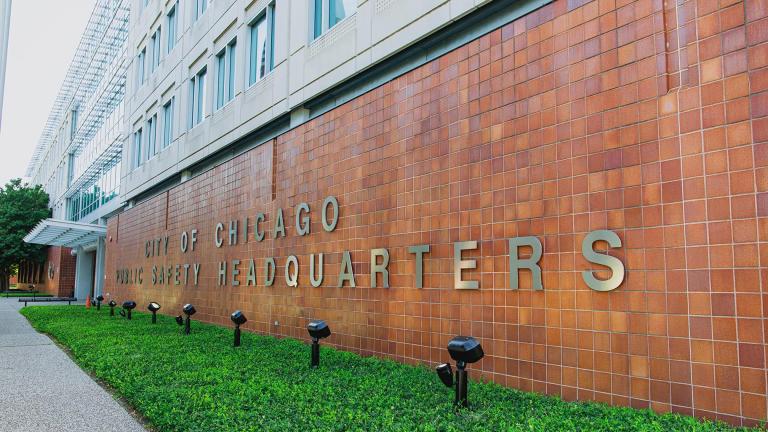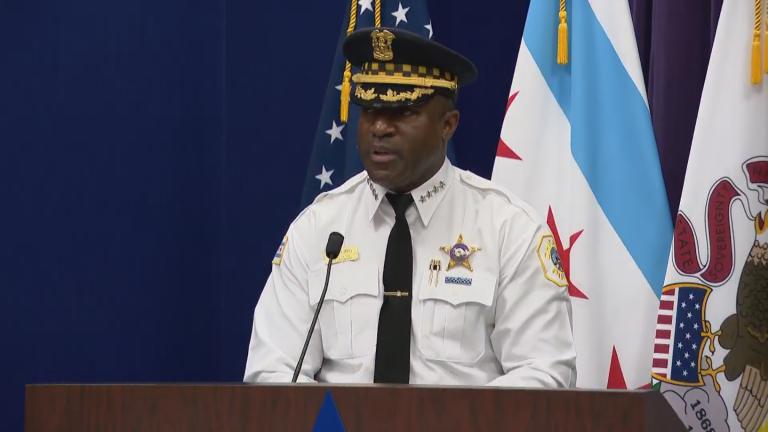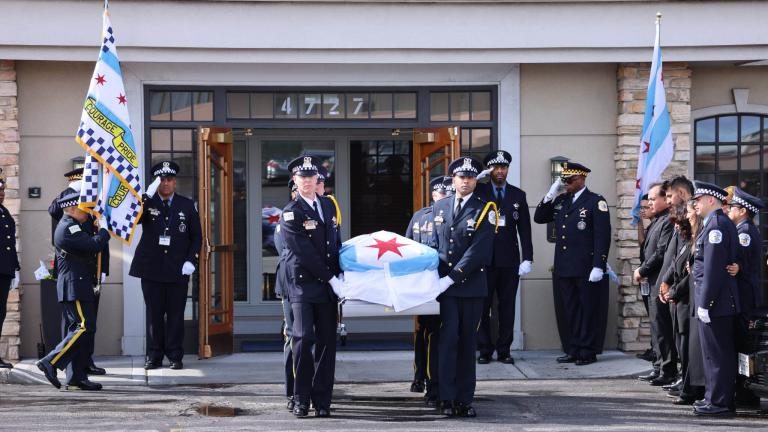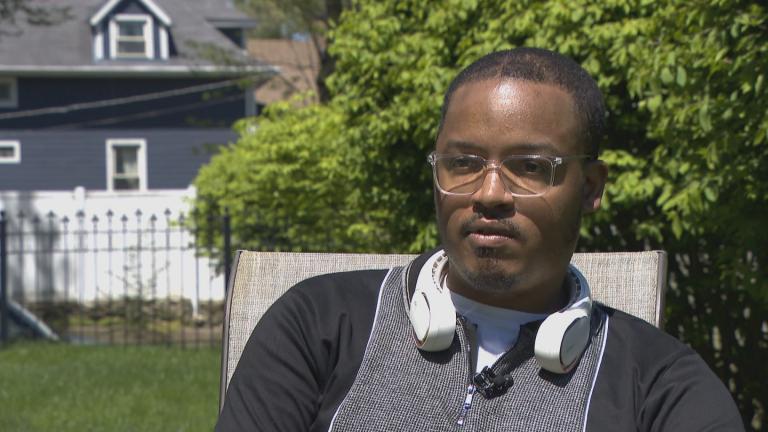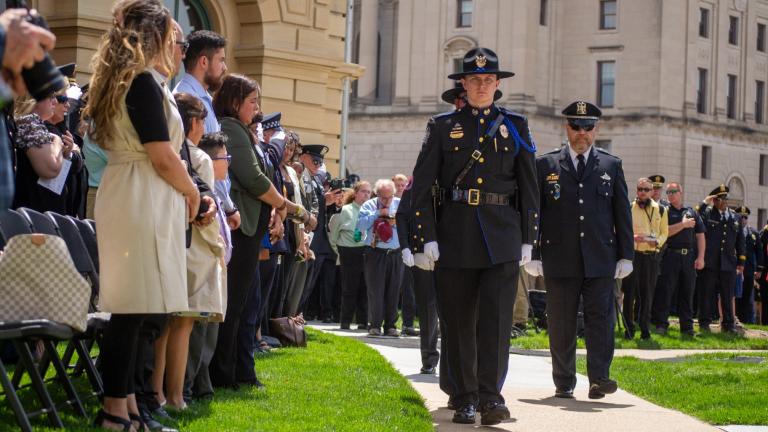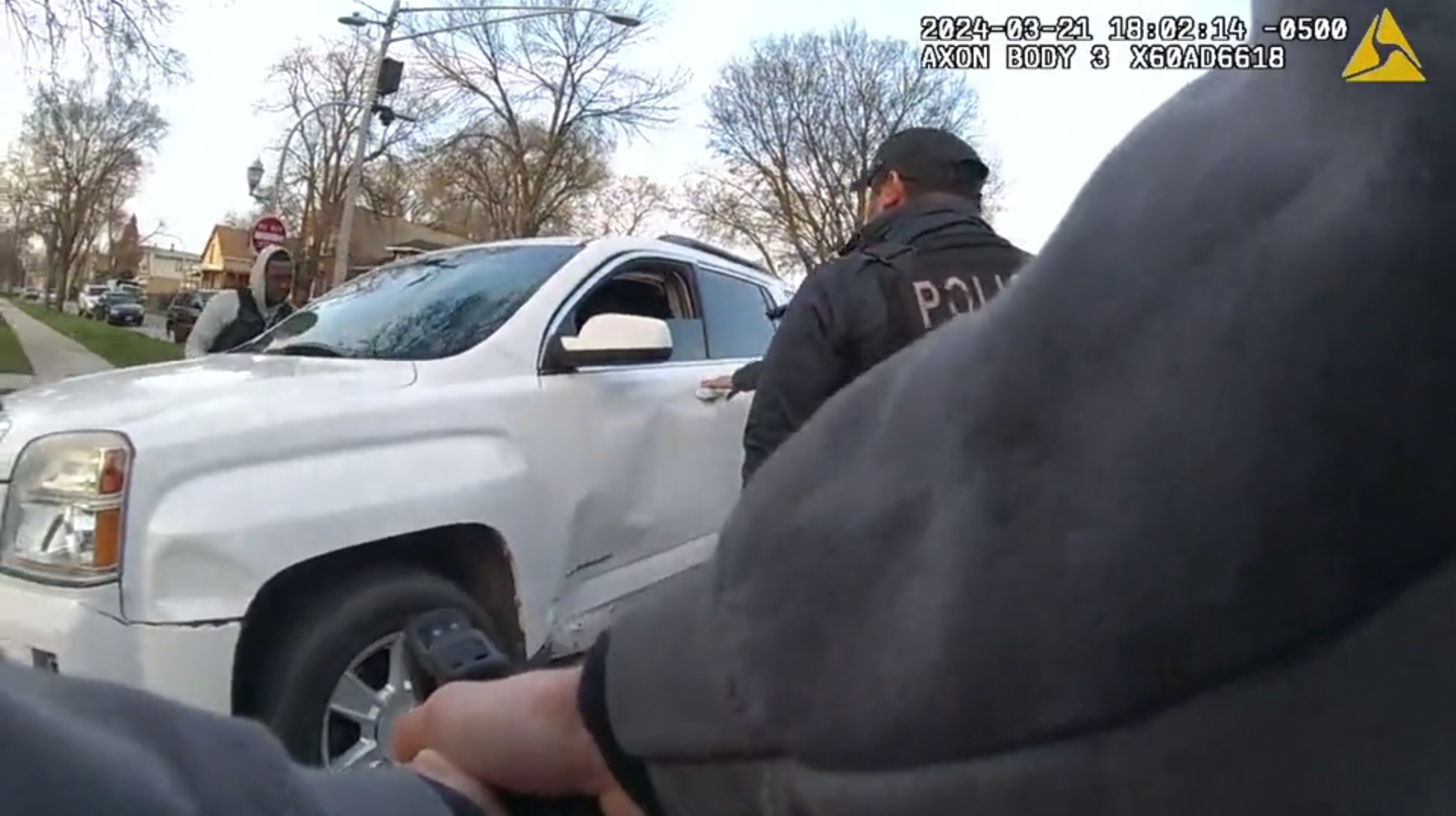 Chicago police officers surround an SUV driven by Dexter Reed moments before shots are fired on March 21, 2024. (Civilian Office of Police Accountability)
Chicago police officers surround an SUV driven by Dexter Reed moments before shots are fired on March 21, 2024. (Civilian Office of Police Accountability)
The four Chicago police officers who fired 96 bullets in 41 seconds during a West Side traffic stop on March 21 hit Dexter Reed 13 times, according to Reed’s autopsy, released Thursday by the Cook County Medical Examiner’s Office.
All five officers who stopped Reed near the border of Humboldt Park and Garfield Park remain on paid administrative leave and have not returned to active duty after completing a mandatory 30-day stint after the shooting, as required by Chicago Police Department rules, a department spokesperson told WTTW News.
Preliminary evidence “appears to confirm” that Reed fired first, wounding an officer, before four officers responded with deadly force, according to the Civilian Office of Police Accountability, the agency known as COPA that is charged with investigating police misconduct.
The officer shot in his wrist is recovering, officials said.
Reed, 26, suffered wounds in his chest, shoulder, back, thighs, knee, leg and buttocks, according to the autopsy. THC, the principle psychoactive ingredient in marijuana, was identified in Reed’s system at the time of his death, according to a toxicology report.
Reed was shot twice in his chest, once in his left shoulder, once in his back, four times in his buttocks, twice in his right thigh, once in his knee and twice in his right leg, according to the autopsy.
“The autopsy report confirms our perspective that these tactical officers used excessive and unreasonable force,” said Andrew M. Stroth, the attorney representing Reed’s family. “Dexter did not have a chance.”
Chicago police Supt. Larry Snelling has yet to act on the recommendation of COPA Chief Administrator Andrea Kersten that the officers who shot Reed be stripped of their police powers during the ongoing probe. That would allow CPD to put the officers on unpaid leave.
Kersten told Snelling that recommendation was based on “grave concerns about the officers’ ability to assess what is a necessary, reasonable, and proportional use of deadly force,” according to a letter released by COPA in response to a Freedom of Information Act request filed by WTTW News.
One of the officers fired at least 50 times at Reed, including three times while he was motionless on the ground, according to Kersten’s letter to Snelling. That officer reloaded his weapon twice, while three other officers reloaded their weapon once, according to the letter.
Reed’s family filed a lawsuit against the city and CPD on Wednesday, accusing the officers who shot and killed him of violating his civil rights with “brutally violent, militarized policing tactics” during an improper traffic stop.
WTTW News paid $75 to obtain a copy of Reed’s autopsy and the result of the toxicology report performed after his death after submitting a Freedom of Information Act request to the Cook County Medical Examiner’s Office. Antonio Favela, associate general counsel in the office of Cook County Board President Toni Preckwinkle, said state law prevented him from waiving the fee.
The documents can be reviewed in person at no charge at the medical examiner’s office, Favela said.
Most government agencies do not charge news organizations to obtain copies of public records. The state’s Freedom of Information Act allows fees to be waived or reduced when information is sought in the public interest, as was the case for this request.
Read More:
- 4 Chicago Police Officers Fired at Dexter Reed 96 Times in 41 Seconds After He Shot Officer in Arm: COPA
- COPA Chief Raises Concerns About Why Police Pulled Over Dexter Reed Before Deadly Shooting
- When Can Chicago Police Officers Use Force? Here’s What to Know
- Breach Between Top Cop, Misconduct Agency Widens Amid Probe of Shooting Death of Dexter Reed
- Top Cop Says CPD Tracks Accusations Against Officers — But Took No Action After 36 Complaints Filed Against Officers Involved in Dexter Reed Shooting
Both COPA and the Cook County State’s Attorney’s Office are probing the shooting.
Reed’s shooting death deepened an already significant chasm between Snelling and Kersten that became public on Feb. 22 when Snelling told the Chicago Police Board that COPA had treated Chicago police officers so unfairly that they are at risk of suicide. The probes also compromise public safety, the city’s top cop said.
Without offering evidence, Snelling also accused Kersten of allowing “personal opinions and speculation” to influence findings that an officer has committed misconduct and should be disciplined.
In response to Snelling’s remarks, Kersten said COPA has always “acted with integrity.”
The breach between Snelling and Kersten deepened on April 12 when Snelling said COPA had acted “irresponsibly” by publicly questioning whether the officers involved in Reed’s death lied about why they stopped his car shortly before the fatal shooting.
Officers told COPA investigators at the scene of the fatal shooting they stopped Reed because they believed he was not wearing his seat belt, a violation, according to reports signed by the officers involved and released by COPA because they are public records.
In her letter to Snelling urging him to strip the officers of their police powers during the probe, Kersten questioned the basis for the traffic stop that led to Reed’s death.
“Specifically, COPA is uncertain how the officers could have seen this seat belt violation given their location relative to (Reed’s) vehicle and the dark tints on (his) vehicle windows,” Kersten wrote. “This evidence raises serious concerns about the validity of the traffic stop that led to the officers’ encounter with (Reed).”
Kersten responded to Snelling’s comments at the April 18 meeting of the Chicago Police Board without mentioning Snelling by name.
“This criticism demonstrates a fundamental lack of understanding of COPA’s role and process, and smacks of hypocrisy,” Kersten said.
Even as Mayor Brandon Johnson has touted his administration’s efforts to be as transparent as possible about Reed’s death, Snelling has bristled at the details released by COPA, warning that they could compromise the investigation.
“There is nothing wrong with transparency; transparency is of the utmost importance,” Snelling said. “But when information is leaked prior to releasing the video, when statements are made without all of the information, an investigation has to begin. And if we’re starting by putting it out in the public in a manner in which we framed it, and we expect the public to see it the way we want them to see it, it’s problematic.”
The very public tension between Snelling and Kersten prompted Anthony Driver, the president of the Community Commission on Public Safety and Accountability, to ask the two to meet with him after he heard from Chicagoans concerned about the ongoing tension.
Driver told WTTW News he hoped the meeting would take place this week, but it had not been scheduled as of Thursday.
“The biggest concern I have is to make sure that the public knows we are being good stewards of the public trust,” Driver said, noting that Snelling and Kersten have to be able to work together. “I want to make sure the system of accountability is working.”
Contact Heather Cherone: @HeatherCherone | (773) 569-1863 | [email protected]
A Safer City is supported, in part, by the Sue Ling Gin Foundation Initiative for Reducing Violence in Chicago.

